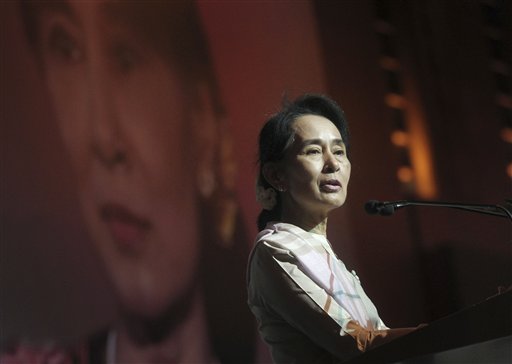Some 2.6 million people from Rangoon, Mandalay and Magwe divisions have thrown their support behind a petition by the opposition National League for Democracy (NLD) party calling for amendments to constitutional Article 436.
The petition is a collaboration between the NLD and activist group 88 Generation Peace and Open Society (88GPOS) and was launched earlier this year to garner nationwide support for amending the clause, which stipulates that any constitutional amendment requires the approval of 75 percent of parliament. The two groups say that it is undemocratic because it provides the military – which is appointed 25 percent of parliamentarian seats – veto power on any proposed amendments.
NLD spokesman Htin Linn Oo said the party has only counted signatories from Rangoon, Mandalay and Magwe divisions, though it has received a lot of backing from people in other states and divisions as well.
“So far we have counted around 2.6 million signatures, but that’s not all of Burma,” Htin Linn Oo said. “We are still waiting for numbers from places such as northern Sagaing Division and Kachin State, which are hard to reach.”
He also said that people in Mandalay Division’s Aungmyay Tharzan Township faced harassment when they signed the petition.
“A group of men came in and started bad-mouthing those who were there to sign the petition, denouncing them for ‘failing to protect the country’,” Htin Linn Oo said, adding that the party is investigating whether the mob were hired by anyone.
Speaking on Sunday from Rangoon, NLD leader Aung San Suu Kyi reiterated how the Constitution, as it currently stands, allows the military an inordinate amount of power.
“If we don’t change 436, it means that the military has virtual veto power over what can or cannot be changed within the Constitution, and I think it should be the elected representatives of the people who decide whether or not the Constitution should be changed,” she was quoted by Reuters as saying.
Amending Article 436 would also open the door to amending other constitutional articles, particularly one that directly concerns Suu Kyi’s ability to run for president in next year’s general elections — Article 59(f), which stipulates that anyone whose spouse or children are foreign-born is prohibited to run for president or vice president. Suu Kyi was married to a British national and has two children by him.
But Suu Kyi said that her party’s focus has always been on Article 436.
“We were never focused on 59(f). It was others who were focused on it,” she said. “We always knew that the key one was 436.”
This nationwide push for support will continue until 19 July, the NLD has said, noting that recent events in some parts of Kachin and Chin states were halted by local authorities.



